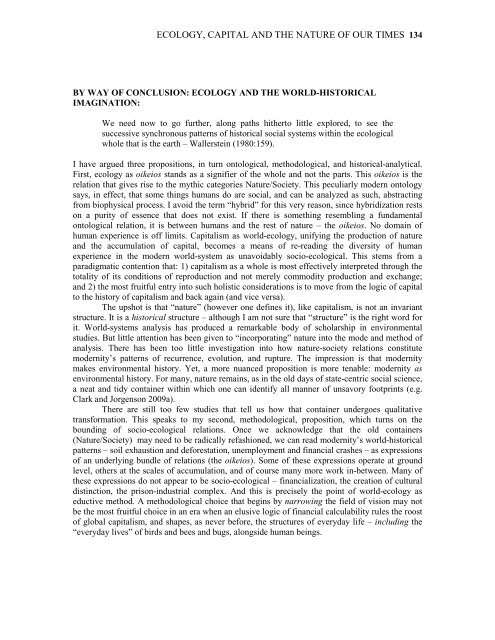Entire Volume 17 issue 1 - Journal of World-Systems Research ...
Entire Volume 17 issue 1 - Journal of World-Systems Research ...
Entire Volume 17 issue 1 - Journal of World-Systems Research ...
You also want an ePaper? Increase the reach of your titles
YUMPU automatically turns print PDFs into web optimized ePapers that Google loves.
ECOLOGY, CAPITAL AND THE NATURE OF OUR TIMES 134<br />
BY WAY OF CONCLUSION: ECOLOGY AND THE WORLD-HISTORICAL<br />
IMAGINATION:<br />
We need now to go further, along paths hitherto little explored, to see the<br />
successive synchronous patterns <strong>of</strong> historical social systems within the ecological<br />
whole that is the earth – Wallerstein (1980:159).<br />
I have argued three propositions, in turn ontological, methodological, and historical-analytical.<br />
First, ecology as oikeios stands as a signifier <strong>of</strong> the whole and not the parts. This oikeios is the<br />
relation that gives rise to the mythic categories Nature/Society. This peculiarly modern ontology<br />
says, in effect, that some things humans do are social, and can be analyzed as such, abstracting<br />
from biophysical process. I avoid the term “hybrid” for this very reason, since hybridization rests<br />
on a purity <strong>of</strong> essence that does not exist. If there is something resembling a fundamental<br />
ontological relation, it is between humans and the rest <strong>of</strong> nature – the oikeios. No domain <strong>of</strong><br />
human experience is <strong>of</strong>f limits. Capitalism as world-ecology, unifying the production <strong>of</strong> nature<br />
and the accumulation <strong>of</strong> capital, becomes a means <strong>of</strong> re-reading the diversity <strong>of</strong> human<br />
experience in the modern world-system as unavoidably socio-ecological. This stems from a<br />
paradigmatic contention that: 1) capitalism as a whole is most effectively interpreted through the<br />
totality <strong>of</strong> its conditions <strong>of</strong> reproduction and not merely commodity production and exchange;<br />
and 2) the most fruitful entry into such holistic considerations is to move from the logic <strong>of</strong> capital<br />
to the history <strong>of</strong> capitalism and back again (and vice versa).<br />
The upshot is that “nature” (however one defines it), like capitalism, is not an invariant<br />
structure. It is a historical structure – although I am not sure that “structure” is the right word for<br />
it. <strong>World</strong>-systems analysis has produced a remarkable body <strong>of</strong> scholarship in environmental<br />
studies. But little attention has been given to “incorporating” nature into the mode and method <strong>of</strong><br />
analysis. There has been too little investigation into how nature-society relations constitute<br />
modernity’s patterns <strong>of</strong> recurrence, evolution, and rupture. The impression is that modernity<br />
makes environmental history. Yet, a more nuanced proposition is more tenable: modernity as<br />
environmental history. For many, nature remains, as in the old days <strong>of</strong> state-centric social science,<br />
a neat and tidy container within which one can identify all manner <strong>of</strong> unsavory footprints (e.g.<br />
Clark and Jorgenson 2009a).<br />
There are still too few studies that tell us how that container undergoes qualitative<br />
transformation. This speaks to my second, methodological, proposition, which turns on the<br />
bounding <strong>of</strong> socio-ecological relations. Once we acknowledge that the old containers<br />
(Nature/Society) may need to be radically refashioned, we can read modernity’s world-historical<br />
patterns – soil exhaustion and deforestation, unemployment and financial crashes – as expressions<br />
<strong>of</strong> an underlying bundle <strong>of</strong> relations (the oikeios). Some <strong>of</strong> these expressions operate at ground<br />
level, others at the scales <strong>of</strong> accumulation, and <strong>of</strong> course many more work in-between. Many <strong>of</strong><br />
these expressions do not appear to be socio-ecological – financialization, the creation <strong>of</strong> cultural<br />
distinction, the prison-industrial complex. And this is precisely the point <strong>of</strong> world-ecology as<br />
eductive method. A methodological choice that begins by narrowing the field <strong>of</strong> vision may not<br />
be the most fruitful choice in an era when an elusive logic <strong>of</strong> financial calculability rules the roost<br />
<strong>of</strong> global capitalism, and shapes, as never before, the structures <strong>of</strong> everyday life – including the<br />
“everyday lives” <strong>of</strong> birds and bees and bugs, alongside human beings.





